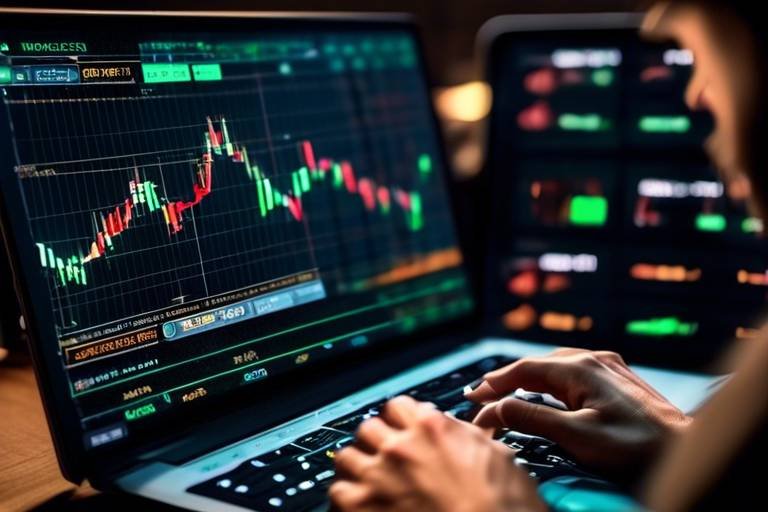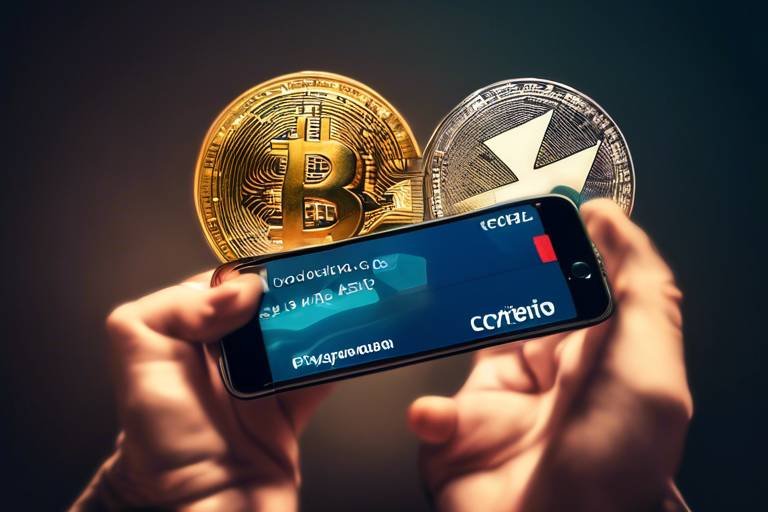How to Participate in Initial Exchange Offerings (IEOs)
Participating in Initial Exchange Offerings (IEOs) can be an exciting venture for both seasoned investors and newcomers to the cryptocurrency landscape. As the digital currency world continues to evolve, IEOs have emerged as a popular fundraising method, providing a bridge between investors and promising blockchain projects. But how exactly do you get involved in these offerings? In this article, we’ll walk you through the essential steps and considerations to ensure you navigate the IEO landscape effectively and safely.
So, what exactly are Initial Exchange Offerings? To put it simply, IEOs are fundraising mechanisms that take place on cryptocurrency exchanges. Unlike their predecessors, Initial Coin Offerings (ICOs), which often operated independently, IEOs leverage the credibility and infrastructure of established exchanges. This means that when you participate in an IEO, you're essentially buying tokens directly through an exchange, which acts as a mediator between the project and the investors.
IEOs have gained traction in the blockchain space due to their unique structure. They not only provide investors with a more secure environment, but they also allow them to access projects that have undergone a vetting process by the exchange. This vetting process helps to filter out scams and poorly conceived projects, making IEOs a more trustworthy option for investors looking to dive into new opportunities.
Investing in IEOs comes with a host of advantages that can enhance your investment experience. One of the most significant benefits is the increased security that IEOs offer. Since exchanges typically implement stringent security measures, your funds are better protected compared to traditional fundraising methods. Additionally, IEOs foster a sense of trustworthiness among investors, as they are backed by reputable exchanges that have a vested interest in the success of the projects they list.
When it comes to security, IEOs are designed with several robust features that protect your investments. For instance, exchanges often utilize advanced security protocols, such as two-factor authentication and cold storage for digital assets. These measures significantly reduce the risk of hacking and fraud, making IEOs a safer investment option.
One of the key components of an IEO is the thorough vetting process that exchanges conduct before listing a project. This process involves extensive due diligence, where the exchange evaluates the project's whitepaper, team, technology, and market potential. By conducting this rigorous assessment, exchanges help ensure that only credible projects are presented to investors, thus safeguarding their investments.
Another critical aspect of IEOs is the involvement of smart contracts, which are often audited for vulnerabilities. These audits are essential in ensuring the integrity of the investment process. By identifying and addressing potential weaknesses in the smart contract code, investors can have greater confidence that their funds are secure and that the project will operate as intended.
However, it’s essential to remember that despite their numerous benefits, IEOs are not without risks. Investors should be aware of potential pitfalls, such as market volatility, project failure, or even the possibility of scams. Understanding these risks is crucial for making informed investment decisions. Always conduct thorough research and never invest more than you can afford to lose.
Selecting the right IEO is crucial for maximizing your investment potential. With so many options available, it’s essential to have a clear strategy in place. Start by conducting in-depth research on the projects that interest you. Look for details on the project’s fundamentals, the experience of the team behind it, and its overall market potential.
Thorough research is vital when considering an IEO. Take the time to analyze the project's whitepaper, which should outline its goals, technology, and roadmap. Additionally, assess the team's experience and track record in the blockchain space. A strong team can significantly increase the likelihood of a project's success.
The reputation of the exchange hosting the IEO cannot be overlooked. A reputable exchange not only enhances the credibility of the project but also increases your chances of a successful investment. Look for exchanges with a proven track record in the IEO space, and don’t hesitate to read reviews or seek feedback from other investors.
- What is the difference between an IEO and an ICO? IEOs are conducted on exchanges and involve a vetting process, while ICOs operate independently and may not have the same level of scrutiny.
- How do I participate in an IEO? To participate, you typically need to create an account on the exchange hosting the IEO, complete any necessary KYC (Know Your Customer) verification, and then purchase the tokens during the offering.
- Are IEOs safe? While IEOs generally offer enhanced security and vetting, they still carry risks. It’s essential to conduct thorough research before investing.

Understanding IEOs
Initial Exchange Offerings, or IEOs, are an innovative fundraising mechanism that has gained significant traction in the cryptocurrency landscape. Unlike their predecessor, Initial Coin Offerings (ICOs), which often lacked oversight and regulatory compliance, IEOs are conducted on established cryptocurrency exchanges. This structure not only enhances the credibility of the projects but also provides a layer of security for investors. When participating in an IEO, investors can purchase tokens directly from the exchange, which acts as an intermediary, ensuring that the project meets specific criteria before it is made available to the public.
One of the key distinctions between IEOs and ICOs lies in the vetting process. In an ICO, the project team is solely responsible for marketing and selling their tokens, often leading to a lack of transparency and potential fraud. However, with IEOs, the exchange takes on a significant role in assessing the project's viability. This means that investors can feel more confident knowing that a reputable exchange has conducted due diligence, reducing the risk of scams and failed projects.
The growing popularity of IEOs can be attributed to several factors. For one, they offer a streamlined process for both projects and investors. Projects can leverage the exchange's existing user base to gain visibility, while investors benefit from a more accessible and secure means of investing in new tokens. Additionally, IEOs often see higher levels of participation compared to ICOs, as the exchange's involvement can instill a sense of trust among potential investors.
In summary, IEOs represent a significant evolution in the fundraising landscape for cryptocurrency projects. By providing a more secure and trustworthy environment for both investors and developers, they are reshaping how new projects raise capital. As the blockchain space continues to grow, understanding the intricacies of IEOs will be essential for anyone looking to navigate this exciting yet complex market.

Benefits of IEOs
Investing in Initial Exchange Offerings (IEOs) has gained traction among cryptocurrency enthusiasts and investors alike, and for good reason. Unlike traditional fundraising methods, IEOs present a unique set of advantages that make them an attractive option for those looking to dive into the blockchain space. One of the most compelling benefits of IEOs is the enhanced security they offer. When participating in an IEO, investors can rest assured that their funds are better protected compared to other methods like Initial Coin Offerings (ICOs). This is largely due to the involvement of established exchanges that implement stringent security measures.
Another significant advantage is the trustworthiness that comes with IEOs. Since these offerings are hosted on reputable exchanges, investors can have greater confidence in the legitimacy of the projects being launched. The vetting process that exchanges conduct before listing projects for IEOs ensures that only the most promising and credible projects make it to the platform. This level of scrutiny is a game changer in an industry often plagued by scams and unreliable ventures.
Additionally, IEOs provide investors with access to vetted projects that have already passed rigorous evaluations. This means less guesswork and more informed decision-making. With exchanges acting as intermediaries, they help filter out projects that may not be worth the investment, allowing investors to focus on those with real potential. The result? A more streamlined investment experience that can lead to higher returns.
Furthermore, the community aspect of IEOs cannot be overlooked. Investors often find themselves part of a larger community that shares similar interests and goals. This sense of belonging can enhance the overall experience and provide valuable insights into the project’s development and progress. Engaging with fellow investors and project teams fosters a collaborative environment that can lead to better outcomes for everyone involved.
In summary, the benefits of participating in IEOs are compelling and multifaceted. From enhanced security and trustworthiness to access to vetted projects and a strong community, IEOs offer a unique investment opportunity in the cryptocurrency landscape. As the blockchain space continues to evolve, understanding these benefits will empower investors to make informed decisions and navigate the IEO landscape effectively.
IEOs often incorporate robust security measures that protect investors' funds. These measures include advanced encryption protocols, two-factor authentication, and cold storage solutions for digital assets. By utilizing these security features, exchanges can significantly reduce the risk of hacks and fraud, which are common concerns in the crypto world.
Exchanges typically conduct thorough due diligence on projects before listing them for IEOs. This vetting process includes evaluating the project's whitepaper, assessing the team’s experience, and analyzing the market potential. By ensuring that only credible projects are listed, exchanges play a crucial role in protecting investors.
Many IEOs involve smart contracts that are audited for vulnerabilities. These audits are essential in ensuring the integrity of the investment process. By identifying and addressing potential flaws before the IEO launch, both the project teams and investors can feel more secure in their investments.
Despite their benefits, IEOs are not without risks. Investors should be aware of the potential for market volatility, project failure, and regulatory changes that could impact their investments. Understanding these risks is crucial for making informed decisions.
Selecting the right IEO is crucial for maximizing investment potential. Investors should conduct thorough research, evaluate the reputation of the hosting exchange, and analyze the project's fundamentals to identify promising opportunities.
Thorough research is vital when considering an IEO. Investors should analyze project fundamentals, team experience, and market potential to ensure they are making informed decisions.
The reputation of the exchange hosting the IEO can impact its success. Assessing an exchange's credibility and track record in the IEO space is essential for mitigating risks.
- What is an IEO? An Initial Exchange Offering (IEO) is a fundraising mechanism where a cryptocurrency exchange acts as an intermediary between the project team and investors.
- How do I participate in an IEO? To participate in an IEO, you typically need to create an account on the exchange hosting the IEO, complete any necessary KYC (Know Your Customer) requirements, and then purchase the tokens during the offering.
- Are IEOs safer than ICOs? Generally, yes. IEOs are considered safer because they are conducted on reputable exchanges that vet projects and implement security measures to protect investors.
- What should I look for when choosing an IEO? Look for project fundamentals, the experience of the team, market potential, and the reputation of the exchange hosting the IEO.

Security Features
When it comes to investing in cryptocurrencies, security is a top priority for any investor. This is where Initial Exchange Offerings (IEOs) shine, as they come with a suite of security features designed to protect your hard-earned funds. Unlike traditional fundraising methods like Initial Coin Offerings (ICOs), IEOs are conducted on reputable cryptocurrency exchanges, which adds an extra layer of safety. But what exactly makes IEOs more secure? Let's dive into some of the key security features that set them apart.
One of the most significant aspects of IEOs is the exchange's role in the fundraising process. When a project is launched as an IEO, it is hosted on a cryptocurrency exchange that has already vetted the project. This vetting process ensures that only credible projects make it to the public, significantly reducing the risk of scams or fraudulent schemes. The exchange acts as a gatekeeper, filtering out projects that don't meet their stringent criteria. In essence, it's like having a trusted friend who helps you choose the best restaurants—only the good ones get through!
Additionally, IEOs often employ robust smart contracts to facilitate transactions. These smart contracts are programmed to execute automatically when certain conditions are met, ensuring that your investment is handled securely. However, not all smart contracts are created equal. This is why many IEOs undergo comprehensive smart contract audits conducted by third-party firms. These audits check for vulnerabilities and ensure that the code is secure, giving investors peace of mind that their funds are safe from potential exploits.
Moreover, IEOs frequently utilize escrow services, which act as a neutral third party to hold funds during the investment process. This means that your funds are only released when the project meets specific milestones or conditions, minimizing the risk of loss due to mismanagement. Picture it like a safety deposit box at a bank; your money is protected until you decide to access it under the right circumstances.
In summary, the security features of IEOs play a pivotal role in creating a safer investment environment. By leveraging the credibility of exchanges, implementing smart contract audits, and utilizing escrow services, IEOs provide a level of security that traditional fundraising methods often lack. As an investor, understanding these security measures can help you navigate the IEO landscape more effectively and confidently.
- What is an IEO? An Initial Exchange Offering is a fundraising method where projects raise capital through a cryptocurrency exchange.
- How do I participate in an IEO? To participate, you typically need to create an account on the exchange hosting the IEO, complete any necessary KYC processes, and fund your account.
- Are IEOs safer than ICOs? Generally, yes. IEOs are conducted on exchanges that vet projects, which can reduce the risk of scams.
- What should I look for in an IEO? Research the project's fundamentals, the team's experience, and the reputation of the hosting exchange.

Exchange Vetting Process
When it comes to participating in Initial Exchange Offerings (IEOs), one of the most critical factors to consider is the . This process is akin to a thorough background check that exchanges perform on projects before they are allowed to launch their IEOs. Imagine you’re about to invest in a startup; you wouldn’t just throw your money at any random company, right? You’d want to know if they have a solid business plan, a reliable team, and a potential market. The same logic applies here. The exchange acts as a gatekeeper, ensuring that only the most promising and trustworthy projects make it to the investors.
The vetting process typically involves several key steps:
- Project Evaluation: Exchanges conduct an in-depth analysis of the project’s whitepaper, business model, and overall viability. They look for clarity in objectives, a defined target audience, and a realistic roadmap.
- Team Assessment: A project is only as good as its team. Exchanges scrutinize the backgrounds of the founders and core team members, checking for relevant experience and past successes in the blockchain space.
- Market Potential: The exchange evaluates the project’s market potential by analyzing competitors, market trends, and the overall demand for the solution being offered.
- Legal Compliance: Ensuring that the project complies with legal regulations is crucial. Exchanges often require documentation that proves the project is adhering to local and international laws.
This rigorous vetting process is not just a formality; it serves a vital purpose in protecting investors. By filtering out projects that don't meet certain standards, exchanges help mitigate the risk of scams and failed ventures. Think of it as a safety net that catches the bad before it can reach your investment portfolio. As a result, when you invest in an IEO, you can do so with a greater degree of confidence, knowing that the project has survived a thorough examination.
Moreover, the success of an IEO can heavily depend on the exchange's reputation. A well-respected exchange that has a history of successful IEOs is more likely to attract serious investors, which can lead to higher funding for the project. This creates a positive feedback loop where successful projects lead to more trust in the exchange, which in turn attracts even better projects. Thus, understanding the exchange's vetting process not only aids in selecting the right IEO but also enhances your overall investment strategy.
In conclusion, the exchange vetting process is a crucial element of IEOs that every investor should pay attention to. By ensuring that only credible projects are listed, exchanges play a significant role in fostering a safer investment environment. So, the next time you come across an IEO, take a moment to investigate the exchange's vetting process; it could be the difference between a wise investment and a costly mistake.
- What is the main purpose of the exchange vetting process? The main purpose is to evaluate the credibility and potential of projects before they are allowed to conduct IEOs, ensuring investor safety.
- How does the vetting process protect investors? By filtering out untrustworthy projects and ensuring legal compliance, the vetting process minimizes the risk of scams and failed ventures.
- Can the vetting process vary between exchanges? Yes, different exchanges may have varying criteria and thoroughness in their vetting processes, affecting the quality of the IEOs they host.

Smart Contract Audits
In the world of Initial Exchange Offerings (IEOs), smart contracts play a pivotal role in ensuring that transactions are executed as intended. These self-executing contracts are programmed to carry out specific actions once predetermined conditions are met. However, just like any software, smart contracts can be prone to vulnerabilities and bugs that could jeopardize investors' funds. This is where come into play.
A smart contract audit is a thorough examination of the contract's code by independent security experts. The goal is to identify any potential flaws or vulnerabilities before the contract goes live. This process not only helps in safeguarding the funds but also boosts investor confidence in the IEO. When a project undergoes a rigorous audit, it signals to potential investors that the team is committed to transparency and security.
During an audit, various aspects of the smart contract are scrutinized, including:
- Code Quality: Auditors assess the overall quality and structure of the code to ensure it's efficient and free of unnecessary complexities.
- Security Vulnerabilities: Any potential loopholes that could be exploited by malicious actors are identified and reported.
- Compliance with Standards: The contract is checked for adherence to industry standards and best practices.
- Functionality Testing: Auditors test the contract's functionalities to ensure it behaves as expected under various scenarios.
Investors should look for IEOs that have undergone comprehensive smart contract audits from reputable firms. This not only minimizes the risk of loss but also enhances the project's credibility in the competitive crypto landscape. Remember, a project that prioritizes security is more likely to succeed, as it builds trust among its potential investors.
In conclusion, smart contract audits are an essential step in the IEO process. They serve as a safety net, ensuring that the investments made are protected from unforeseen vulnerabilities. As an investor, being aware of the auditing process and its significance can empower you to make informed decisions when participating in IEOs.
- What is a smart contract audit?
A smart contract audit is a detailed review of a smart contract's code by security experts to identify vulnerabilities and ensure the contract operates as intended. - Why are smart contract audits important?
They are crucial for protecting investors' funds and enhancing the credibility of the project. - How can I verify if an IEO's smart contract has been audited?
Check the project's official website or whitepaper for audit reports and details about the auditing firm.

Risks Involved
When diving into the world of Initial Exchange Offerings (IEOs), it's crucial to acknowledge that while they come with enticing benefits, they also carry their fair share of risks. Just like crossing a busy street, you wouldn’t want to step out without looking both ways. Here are some key risks to consider before you jump in:
First and foremost, market volatility is a significant concern. The cryptocurrency market is known for its wild price swings, and IEOs are no exception. After the initial excitement of an IEO, the prices can fluctuate dramatically. Imagine investing in a project only to see its value plummet within days. This uncertainty can be stressful and may lead to panic selling, which can further drive prices down.
Another risk factor is the project viability. Not all projects that launch through IEOs are guaranteed to succeed. Some may have ambitious goals but lack a solid plan or execution strategy. Therefore, it's essential to conduct thorough research on the project's fundamentals, including its whitepaper, use case, and the team's background. Are they experienced? Have they successfully launched projects before? These questions are critical in determining whether the project has the potential for long-term success.
Additionally, there's the risk of regulatory scrutiny. As governments around the world continue to develop regulations for cryptocurrencies, IEOs can face sudden changes in legal status. This uncertainty can lead to project delays, or worse, shutdowns. It’s akin to building a sandcastle at the beach only to have the tide come in and wash it away. Staying informed about the regulatory landscape is vital to mitigate this risk.
Security risks also play a significant role in the IEO landscape. While exchanges typically implement robust security measures, they are not immune to hacks or breaches. If an exchange is compromised, investors' funds could be at risk. Always ensure that the exchange you choose has a solid track record and employs advanced security protocols. Think of it like choosing a bank; you want to ensure your money is safe in a reputable institution.
Finally, liquidity issues can be a concern. After an IEO, some tokens may not have sufficient trading volume, making it challenging to sell your holdings without affecting the price. This lack of liquidity can trap investors in their positions, preventing them from cashing out when they want to. It's essential to consider the trading volume of the token on the exchange and its overall market demand.
In summary, while IEOs present exciting opportunities, they come with risks that should not be overlooked. By conducting thorough research, staying informed about market conditions, and choosing reputable exchanges, you can navigate these risks more effectively. Always remember that in the world of crypto, caution and diligence are your best friends.
- What is an IEO? An Initial Exchange Offering (IEO) is a fundraising method where a cryptocurrency exchange acts as an intermediary between investors and a project, ensuring a more secure investment process.
- How do I participate in an IEO? To participate, you typically need to create an account on the exchange hosting the IEO, complete any necessary verification, and then purchase the tokens during the offering period.
- Are IEOs safer than ICOs? Generally, yes. IEOs are considered safer due to the exchange's vetting process, which helps ensure that only credible projects are listed.
- What should I consider before investing in an IEO? Always research the project's fundamentals, the team's experience, the exchange's reputation, and the potential risks involved.

How to Choose an IEO
Choosing the right Initial Exchange Offering (IEO) can feel like navigating a maze—exciting but overwhelming! To maximize your investment potential, it's essential to approach this decision with a clear strategy. Start by diving deep into project fundamentals. This means looking beyond the flashy marketing and understanding what the project is all about. What problem does it solve? Who are the target users? A solid project should have a clear vision and a viable solution to a real-world issue. You wouldn’t invest in a company without understanding its business model, right? The same logic applies here.
Next, consider the team behind the IEO. A project’s success is often tied to the experience and credibility of its founders and developers. Look for individuals with a proven track record in the blockchain space or relevant industries. You might even want to check out their LinkedIn profiles or previous projects. If the team has faced challenges before and emerged successfully, that’s a good sign! Remember, investing in a project is like betting on a horse; you want to ensure the jockey knows what they’re doing.
Another critical factor is the market potential. Analyze the industry the project is targeting. Is it a growing market? Are there existing competitors, and how does this project differentiate itself? Understanding the market landscape can provide insights into the project's future viability. It’s like trying to predict the weather; having the right data can help you make an informed decision.
While evaluating the project, don’t forget to assess the reputation of the exchange hosting the IEO. A reputable exchange can significantly impact the success of the offering. Look for exchanges that have a history of successful IEOs and positive user reviews. You can often find discussions in forums or social media where users share their experiences. If an exchange has a track record of supporting projects that have delivered on their promises, that’s a green flag!
Finally, keep an eye on the community engagement. A strong, active community can be a great indicator of a project's potential success. Check platforms like Telegram, Discord, or Twitter to see how the community interacts with the project. Are they asking questions? Are the developers responsive? A vibrant community often translates to better support and marketing for the project.
In summary, choosing an IEO is about doing your homework. By focusing on the project fundamentals, team experience, market potential, exchange reputation, and community engagement, you can make a more informed decision. Remember, investing in IEOs is not just about the potential gains; it’s about understanding the risks and making choices that align with your financial goals.
- What is an IEO? An Initial Exchange Offering (IEO) is a fundraising method conducted on a cryptocurrency exchange where investors can purchase tokens for a new project.
- How do I participate in an IEO? To participate, you typically need to create an account on the exchange hosting the IEO, complete any necessary KYC (Know Your Customer) requirements, and then follow the instructions to purchase tokens during the offering.
- Are IEOs safer than ICOs? Yes, IEOs are generally considered safer than ICOs because they are vetted by exchanges, which conduct due diligence on the projects before listing them.
- What should I look for in an IEO? Look for solid project fundamentals, an experienced team, market potential, a reputable exchange, and strong community engagement.

Researching Projects
When diving into the world of Initial Exchange Offerings (IEOs), one of the most critical steps you can take is to thoroughly research the projects you are considering investing in. Think of it as scouting for treasure; you wouldn't just dig anywhere, right? You'd want to know where the gold is buried! In this case, the 'gold' represents projects that have the potential to yield significant returns. So, what should you focus on during your research?
First and foremost, examining the project's whitepaper is essential. This document outlines the project's goals, technology, and roadmap. A well-crafted whitepaper should be clear, detailed, and free of jargon that could confuse potential investors. Look for sections that explain the problem the project aims to solve and how it plans to achieve this. If the whitepaper raises more questions than answers, it might be time to dig deeper or reconsider your investment.
Next, consider the team behind the project. A strong, experienced team can make a world of difference in a project's success. Research the backgrounds of the founders and key team members. Have they previously launched successful projects? Do they have a solid reputation in the blockchain community? A team with a proven track record is often a good indicator of a project’s potential success.
Another critical aspect to investigate is the market potential. Is there a demand for the solution the project offers? Analyze the target market and competition. If a project is entering a saturated market without a clear differentiator, it may struggle to gain traction. Conversely, if it addresses a growing need or an emerging market, it could present a lucrative opportunity. You might also want to explore the project's partnerships and collaborations. Strong partnerships can lend credibility and enhance the project’s visibility.
Lastly, don’t overlook the importance of community engagement. A vibrant, active community can be a strong indicator of a project’s health. Check out the project's social media channels and forums. Are users actively discussing the project? Are they excited about its future? A passionate community can provide valuable insights and support, making it a crucial factor in your research.
In summary, researching IEO projects is not just a box to tick off on your investment checklist; it's a vital step that can significantly influence your investment's success. By examining the whitepaper, assessing the team's experience, analyzing market potential, and gauging community engagement, you can make informed decisions that align with your investment goals. Remember, in the world of IEOs, knowledge is power!
- What is an IEO? An Initial Exchange Offering is a fundraising method where a cryptocurrency exchange acts as an intermediary, allowing projects to sell their tokens directly to investors.
- How do I participate in an IEO? To participate, you typically need to create an account on the exchange hosting the IEO, complete any necessary verification processes, and then contribute funds during the offering period.
- What are the risks of investing in IEOs? While IEOs offer some security features, risks include market volatility, potential project failure, and regulatory changes that could impact the token's value.
- How can I assess the credibility of an exchange? Look for reviews, check their history with previous IEOs, and consider their security measures to ensure they have a solid reputation.

Evaluating Exchange Reputation
When diving into the world of Initial Exchange Offerings (IEOs), one of the most critical factors to consider is the reputation of the exchange hosting the offering. Just like you wouldn’t buy a car from a shady dealership, you shouldn’t invest your hard-earned money into projects listed on an exchange with a questionable track record. A reputable exchange not only enhances your chances of a successful investment but also provides a layer of security and trust that is invaluable in the volatile world of cryptocurrency.
So, what should you look for when evaluating an exchange's reputation? Here are some key aspects to consider:
- Track Record: Examine how long the exchange has been in operation. A well-established exchange with a long history is generally more trustworthy than a new player in the market.
- User Reviews: Check out user feedback on forums, social media, and review sites. Positive reviews can indicate a reliable exchange, while numerous complaints may raise red flags.
- Security Measures: Investigate the security protocols the exchange has in place. Look for features like two-factor authentication (2FA), cold storage for assets, and transparency in their security practices.
- Regulatory Compliance: Ensure the exchange complies with local regulations. Exchanges that adhere to legal requirements often have more stringent security measures and better customer protection.
Additionally, it’s essential to understand that the reputation of an exchange can significantly influence the success of an IEO. A well-respected exchange typically attracts more investors, leading to higher demand and potentially better returns. Conversely, if an exchange has a tarnished reputation, it may struggle to generate interest, which can negatively impact the project’s viability.
To further illustrate this point, let’s take a look at a comparison of two exchanges based on several factors:
| Exchange | Years in Operation | User Rating | Security Features | Regulatory Compliance |
|---|---|---|---|---|
| Exchange A | 5 | 4.5/5 | 2FA, Cold Storage | Yes |
| Exchange B | 1 | 2.0/5 | No 2FA | No |
As you can see from the table, Exchange A has a solid reputation, while Exchange B raises several concerns. Choosing to invest through a reputable exchange like Exchange A can significantly enhance your IEO experience and reduce the risks associated with your investment.
In conclusion, evaluating the reputation of an exchange is not just a box to check off; it’s a fundamental step in ensuring your investment is as secure and promising as possible. By taking the time to research and analyze the factors mentioned above, you’ll be better equipped to make informed decisions in the exciting yet unpredictable world of IEOs.
Q: What is the importance of exchange reputation in IEOs?
A: The reputation of the exchange hosting the IEO is crucial as it impacts the security, trustworthiness, and overall success of the investment. A reputable exchange is more likely to conduct thorough vetting of projects and provide better security measures.
Q: How can I find user reviews for exchanges?
A: User reviews can be found on cryptocurrency forums, social media platforms, and dedicated review websites. It's essential to read a variety of opinions for a well-rounded view.
Q: What security features should I look for in an exchange?
A: Look for two-factor authentication, cold storage for funds, and a transparent approach to security. These features help protect your investments from hacks and fraud.
Q: Are new exchanges less trustworthy?
A: Not necessarily, but new exchanges may not have a proven track record. It's crucial to conduct thorough research and consider factors like security measures and user feedback before investing.
Frequently Asked Questions
- What is an Initial Exchange Offering (IEO)?
An Initial Exchange Offering (IEO) is a fundraising method where a cryptocurrency exchange acts as an intermediary between the project and investors. Unlike Initial Coin Offerings (ICOs), where projects manage their fundraising independently, IEOs provide a layer of security and trust since the exchange conducts due diligence and vetting of the projects before listing them.
- How do I participate in an IEO?
To participate in an IEO, you'll need to follow a few simple steps: first, create an account on the exchange hosting the IEO. Next, complete any necessary verification processes. Once you're set up, you can fund your account with the required cryptocurrency and then buy the tokens during the IEO sale. It's as easy as pie!
- What are the benefits of investing in IEOs?
Investing in IEOs offers several benefits, including enhanced security due to the exchange's vetting process, access to projects that have been thoroughly evaluated, and increased trustworthiness. Additionally, IEOs often provide investors with a more streamlined buying experience compared to traditional fundraising methods.
- Are there risks involved with IEOs?
Yes, while IEOs come with certain advantages, they also have risks. These can include market volatility, the potential for project failure, and the possibility of scams. It's crucial for investors to conduct thorough research and understand the risks before diving in.
- How can I choose the right IEO to invest in?
Choosing the right IEO involves careful research. Look at the project's fundamentals, evaluate the experience of the team behind it, and assess the market potential. Additionally, consider the reputation of the exchange hosting the IEO, as this can significantly impact the project's success.
- What should I know about the exchange vetting process?
The exchange vetting process is crucial as it involves a thorough review of the project before it can launch an IEO. This includes analyzing the project's whitepaper, team, and technology. A reputable exchange will conduct this process to ensure that only trustworthy projects are offered to investors.
- Are smart contracts audited in IEOs?
Yes, many IEOs involve smart contracts that are subjected to audits for vulnerabilities. These audits are essential for ensuring the integrity of the investment process and protecting investors from potential risks associated with poorly coded contracts.



















